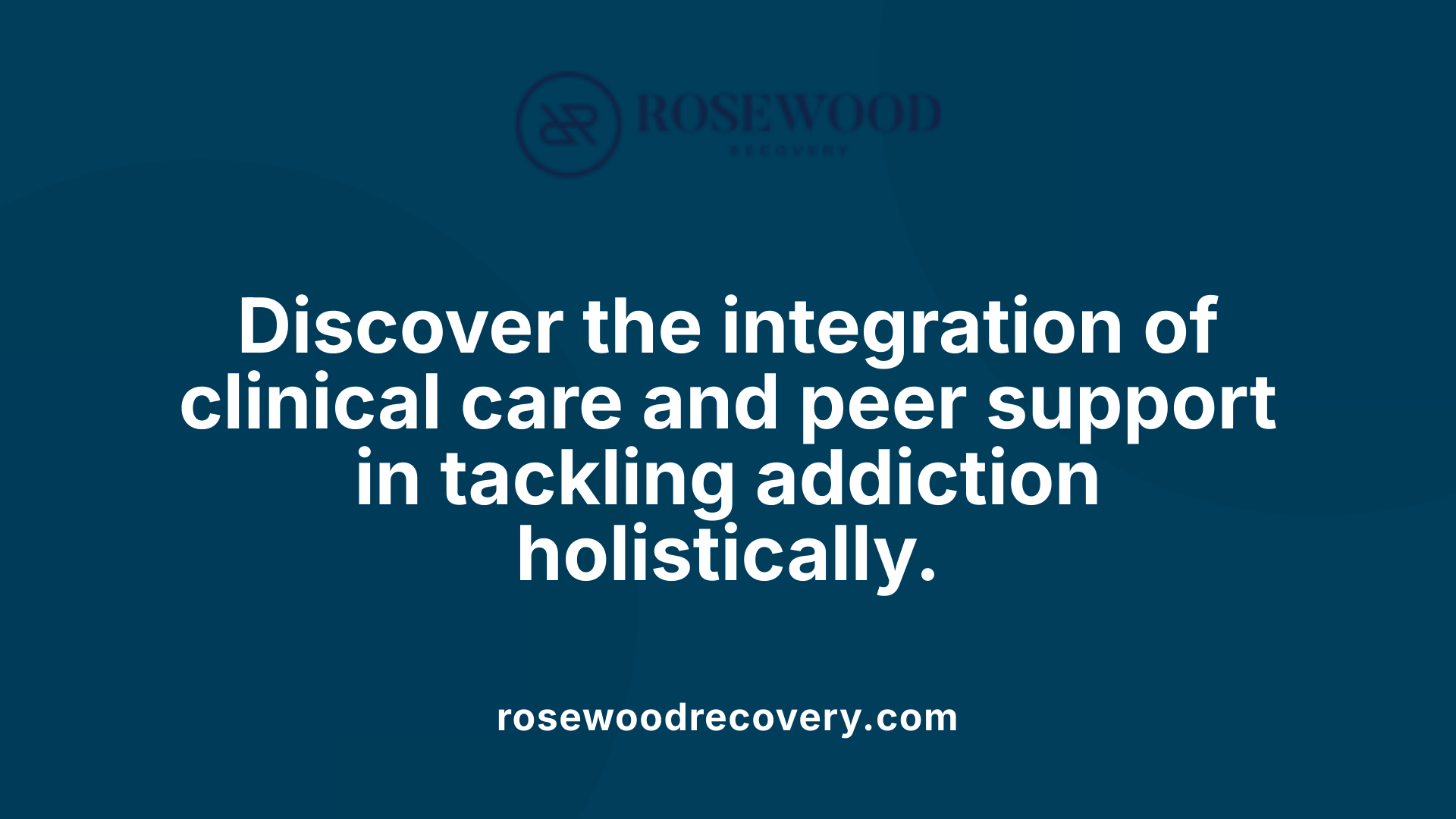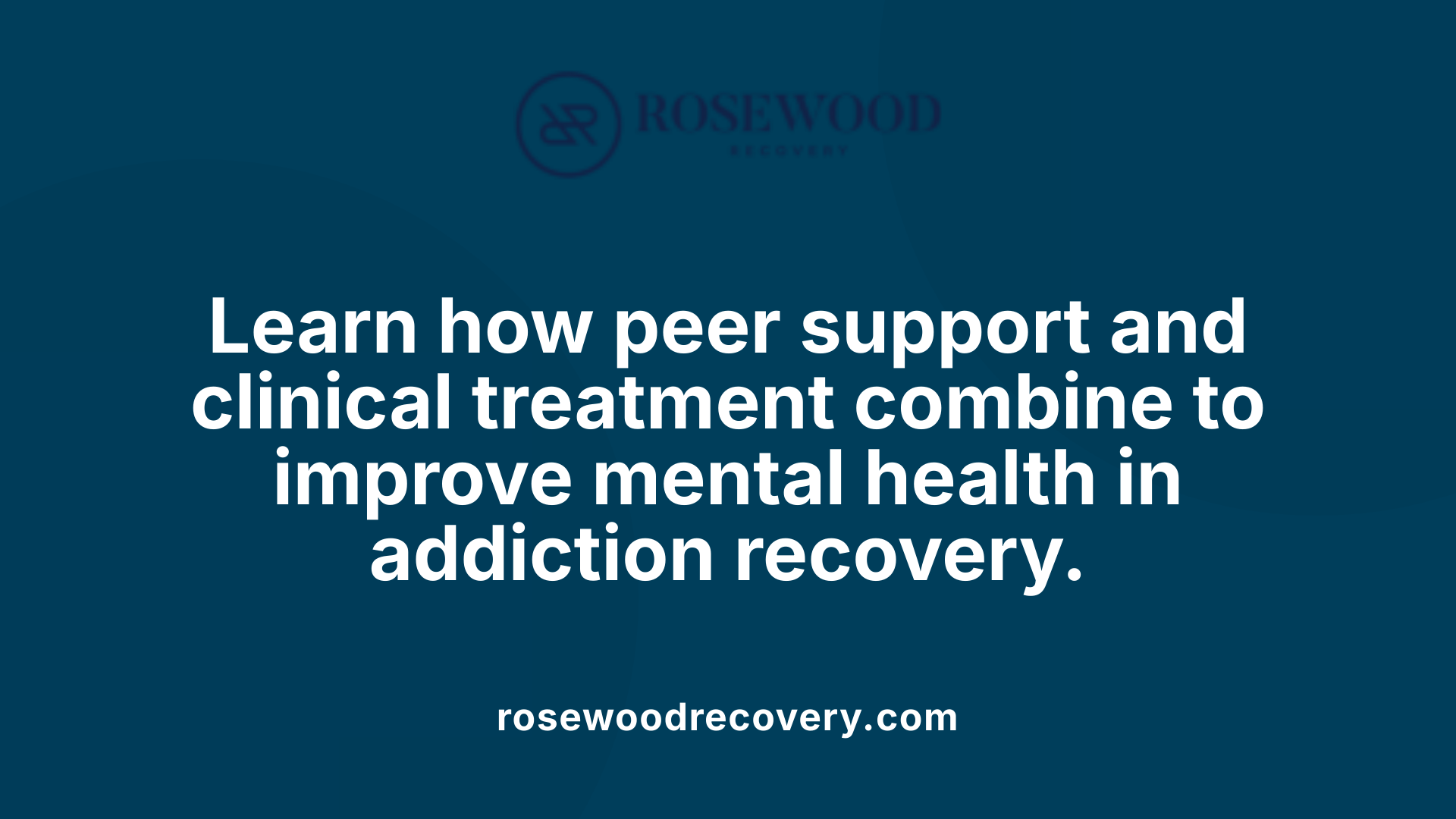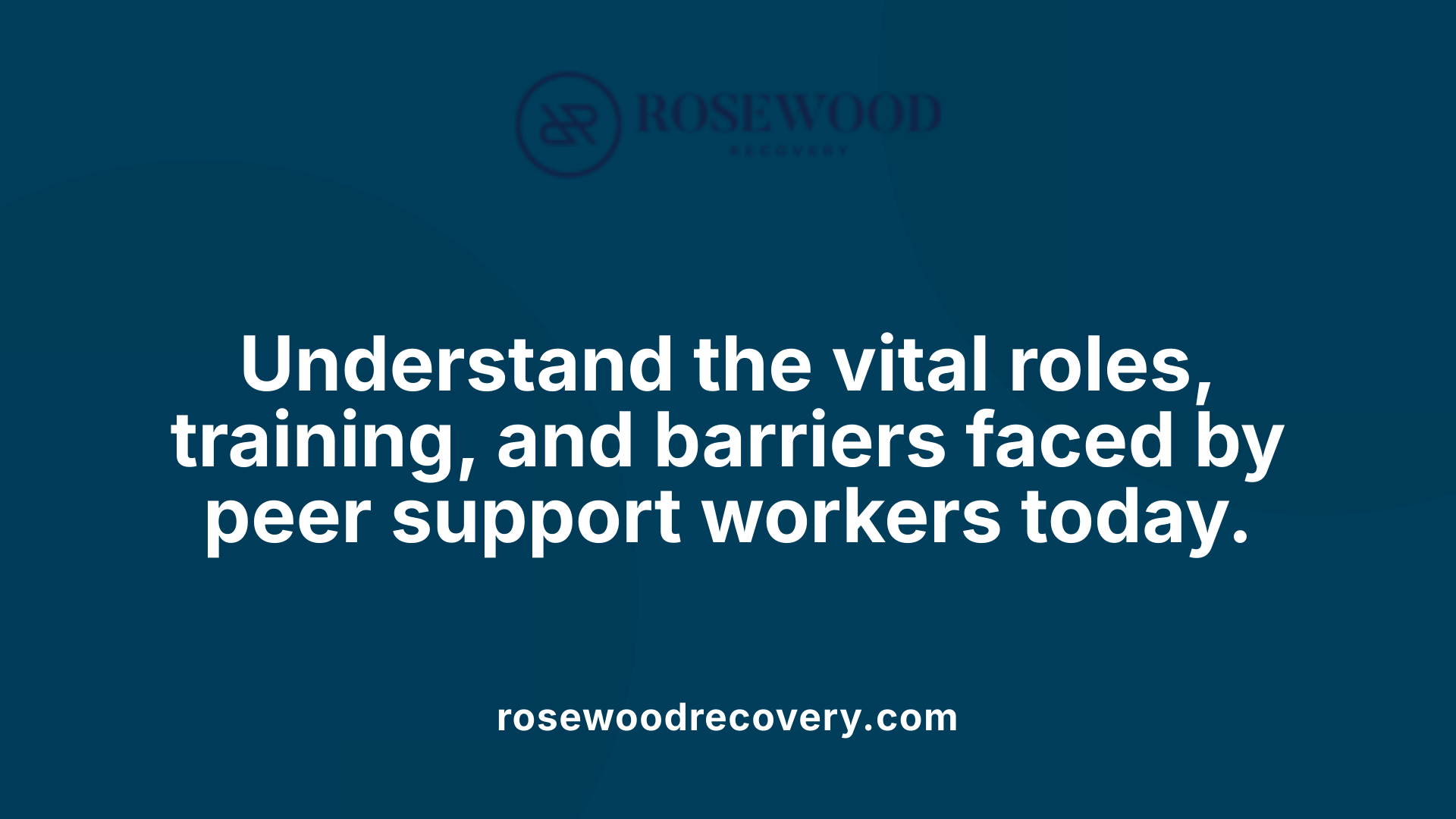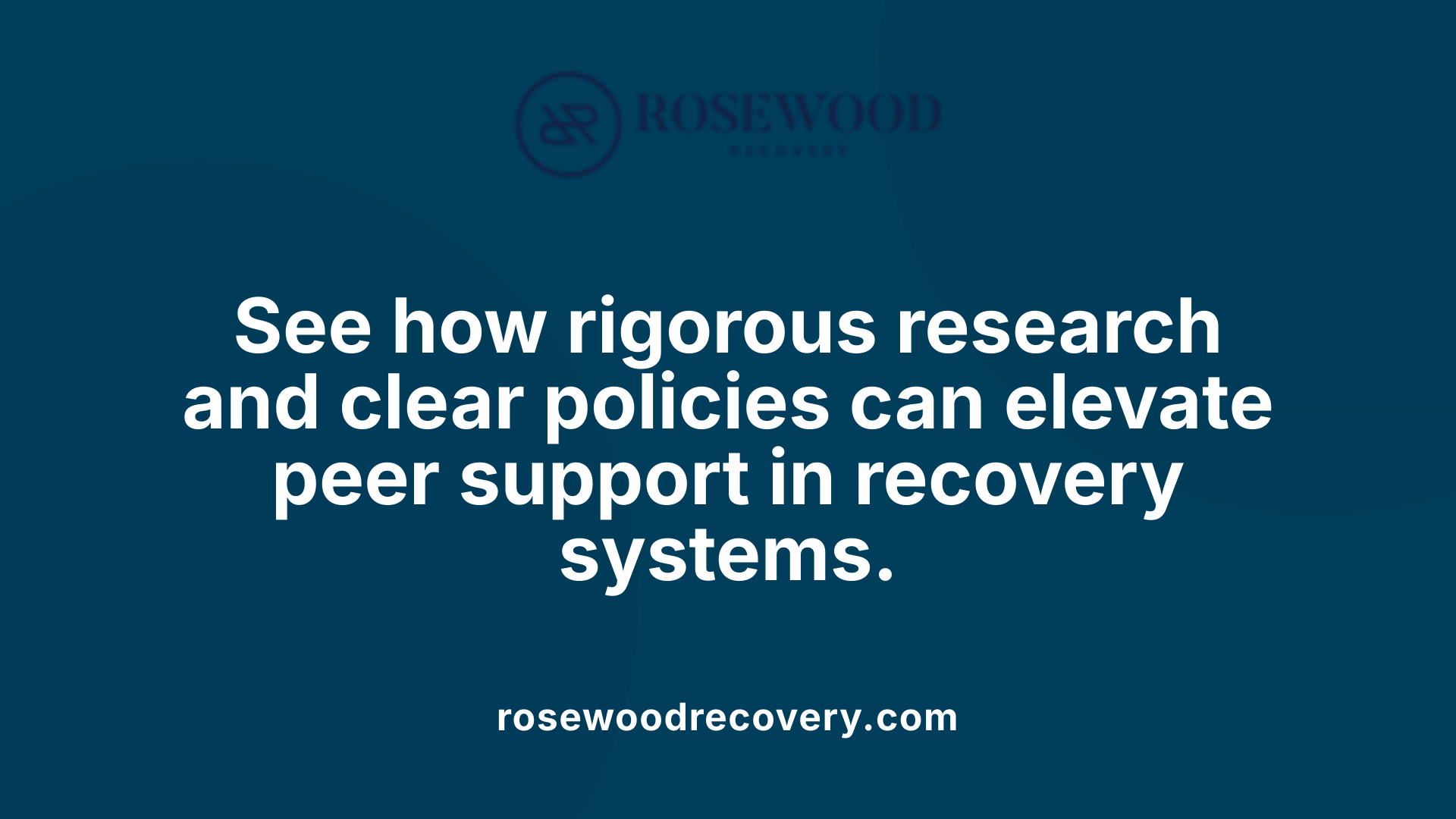Understanding Peer Support in Addiction Treatment
Peer support has emerged as a vital component in the comprehensive treatment of substance use and co-occurring mental health disorders. Rooted in shared experience and mutual understanding, peer support integrates nonprofessional, experiential knowledge with clinical care to enhance recovery outcomes. This article explores the multifaceted role of peer support in addiction treatment, its impact on mental health and relapse prevention, and the evolving roles of peer support workers and coaches within recovery-oriented systems of care.
Comprehensive Treatment Services and the Role of Peer Support

What kinds of treatment services are available for substance abuse?
Treatment services for substance abuse offer a diverse set of options suited to the individual’s specific needs and the intensity of their disorder. These include:
- Outpatient Services: Counseling, educational programs, and medication management where patients visit clinics periodically.
- Inpatient and Residential Care: More intensive, round-the-clock care for severe addiction cases.
- Medication-Assisted Treatment (MAT): Utilizing drugs like methadone, buprenorphine, and naltrexone to control cravings and ease withdrawal.
- Behavioral Therapies: Techniques such as cognitive-behavioral therapy and motivational interviewing address psychological factors and promote lasting behavioral changes.
- Support Groups and Peer Recovery Programs: Providing emotional validation, community connection, and practical guidance outside clinical settings.
These varied services combine to form comprehensive frameworks aimed at supporting long-term recovery from substance use disorders.
What forms of addiction can comprehensive treatment programs address?
Comprehensive treatment programs tackle a broad spectrum of addictions, including:
- Substance Use Disorders: Alcohol, opioids, stimulants, cannabis, and nicotine addictions.
- Behavioral Addictions: Gambling, internet and gaming addiction, sex, shopping, and eating disorders.
Programs adapt their care levels—ranging from outpatient to inpatient—based on severity. Treatment modalities incorporate medication, individual and group psychotherapy, family involvement, and peer support mechanisms. This holistic approach addresses both physiological dependence and psychological triggers, improving outcomes across addiction types.
How is peer support integrated with clinical treatment?
Peer support has become a vital complement to clinical treatment by:
- Offering nonclinical assistance through peer recovery coaches and support workers who share lived experience to foster hope and motivation.
- Enhancing treatment adherence, reducing relapse rates, and improving social connectedness.
- Extending recovery support beyond clinical settings into daily life environments.
- Collaborating with healthcare providers to create recovery-oriented systems of care that prevent relapse and sustain recovery.
Research indicates that integrating peer support with professional treatment boosts treatment retention by approximately 20%, lowers relapse rates, and increases aftercare participation significantly. This integration helps address emotional, social, and practical needs that traditional clinical services may not fully cover, improving the overall recovery landscape.
| Treatment Services | Addictions Addressed | Role of Peer Support |
|---|---|---|
| Outpatient & Inpatient Care | Alcohol, opioids, stimulants | Enhances treatment retention and reduces relapse |
| Medication-Assisted Treatment | Cannabis, nicotine | Provides emotional and instrumental support |
| Behavioral Therapies | Behavioral addictions | Bridges clinical care and community recovery |
| Support Groups & Peer Programs | Gambling, gaming, eating | Promotes long-term recovery and social connectedness |
Addressing Mental Health Challenges through Integrated Peer Support

How are mental health issues addressed in addiction treatment?
Mental health issues in addiction treatment are tackled through integrated, multidisciplinary approaches that treat both substance use disorders (SUDs) and co-occurring mental health conditions simultaneously. These approaches involve collaboration between clinicians, social workers, and peer support workers (PSWs), who each bring unique expertise to foster comprehensive care.
Peer support plays a crucial role in mental health recovery by providing non-clinical, lived-experience-based assistance. Peer support workers serve as role models and advocates, bridging gaps between patients and clinical providers. Their shared experiences help alleviate stigma and increase motivation for sustained recovery.
Integrated care often begins with early screening and comprehensive assessments, enabling stage-wise interventions tailored to individual needs. Psychotherapy, medication, and behavioral therapies form the clinical backbone, while peer support groups and recovery programs extend support into community settings.
Studies have shown that the combination of clinical treatment and peer support enhances treatment engagement, retention, and satisfaction. Peer support contributes to improved psychosocial outcomes such as reduced craving, better emotion regulation, and enhanced social connectedness — all essential for managing dual diagnoses.
By addressing both addiction and mental health needs within a cohesive system, integrated peer support strengthens relapse prevention and promotes long-term wellness. This holistic approach reduces hospital readmissions and supports recovery across multiple life domains, ultimately improving quality of life for individuals facing co-occurring disorders.
The Impact of Peer Support Groups on Recovery Outcomes
What is the historical context of peer support in addiction recovery?
Peer support groups have long been integrated into addiction recovery frameworks. Early examples include 12-step programs such as Alcoholics Anonymous and Narcotics Anonymous, which emphasize shared experiences and social roles. Therapeutic communities and community reinforcement approaches also highlight mutual support as essential for recovery from substance use.
What are the benefits of peer support groups?
Recent studies underscore multiple benefits of participating in peer support groups. These include decreased substance use, increased engagement with treatment programs, and improved psychosocial outcomes like enhanced self-efficacy and reduced cravings. Peer support also fosters a sense of community, reduces stigma, and offers emotional validation, greatly aiding individuals’ long-term recovery.
How do peer support groups affect relapse and social support?
Peer support groups contribute significantly to lowering relapse rates and homelessness among people in recovery. Evidence shows that members experience better treatment adherence and reduced risky behaviors. Additionally, peer groups strengthen social support networks, which play a vital role in sustaining abstinence by providing ongoing encouragement and practical guidance.
Peer support, therefore, serves as a powerful complement to clinical treatments, enhancing recovery through shared lived experiences and community building.
The Expanding Role and Challenges of Peer Support Workers

What roles and responsibilities do peer support workers have?
Peer support workers (PSWs) play vital roles in substance use recovery by leveraging their lived experience to aid others. Their responsibilities include mentoring, advocating, leading recovery groups, sharing resources, building community connections, and facilitating goal-setting. They also partake in training, supervising peers, developing recovery resources, and educating the public and policymakers. These multifaceted roles enhance treatment retention, reduce relapse, and promote community engagement, bridging gaps between formal treatment and everyday recovery support.
How are peer support workers trained and supervised?
Training and supervision are crucial for PSWs to maintain effectiveness and sustainability. Formal training often covers recovery principles, trauma-informed care, relapse prevention, and understanding the scope of practice. Supervision ideally comes from individuals who themselves have lived experience, providing guidance, support, and accountability. This structure helps PSWs navigate challenges, maintain professional boundaries, and deliver consistent, trauma-sensitive support.
What barriers and stigma do peer support workers face?
PSWs encounter several challenges including systemic barriers like limited access to housing, insurance issues, and treatment program availability. They often face difficulties establishing credibility within healthcare teams, partly due to misconceptions about their non-clinical backgrounds. Stigma around substance use can also extend to PSWs, impacting their acceptance. Clear role definitions and ongoing advocacy are essential to overcome these hurdles and enhance the recognition of peer expertise.
How are peer support workers integrated within healthcare systems?
The integration of PSWs into healthcare systems has grown since the early 2000s, reflecting a move towards recovery-oriented care models. Their inclusion improves relationships between patients and providers and expands behavioral health support beyond clinical settings. As valued team members, PSWs contribute to a reduction in hospital readmissions, increase aftercare participation, and foster environments that support sustained recovery. Recognition by medical professionals of PSWs’ unique lived experience helps solidify their place within multidisciplinary teams.
Peer Recovery Coaches: Bridging Clinical and Community Recovery
What are the functions of peer recovery coaches?
Peer recovery coaches (PRCs) play critical roles in the continuum of substance use recovery by serving as liaisons between treatment programs and community resources. Their tasks include advocating for clients, sharing resources, community building, mentoring, and facilitating goal setting. PRCs also assist with stress management and coping strategies, provide counseling and case management, and educate individuals on recovery processes and preventing relapse. Their lived experience in recovery enriches their ability to connect empathetically and practically with those they support.
How do peer recovery coaches impact treatment adherence and stress management?
Research highlights that PRC involvement enhances treatment adherence and self-efficacy among individuals with substance use disorders. By offering emotional and informational support, PRCs help clients navigate the complexities of recovery, leading to improved stress control and quality of life. The supportive relationship built with coaches reduces feelings of isolation and empowers clients to manage triggers effectively, contributing to sustained abstinence.
How do peer recovery coaches support long-term recovery?
PRCs extend recovery support beyond clinical settings into everyday life, focusing on long-term wellness and community engagement. They help build recovery capital—internal and external resources essential for ongoing recovery. Their non-clinical assistance promotes self-actualization and strengthens social connectedness, while also guiding clients through personalized recovery plans based on individual needs and strengths.
What evidence exists regarding the effectiveness of peer recovery coaches?
Systematic reviews and randomized controlled trials indicate positive outcomes due to PRC interventions, including decreased substance use, increased treatment retention, and higher abstinence rates. For example, peer-delivered motivational interventions have demonstrated improved adherence to outpatient treatment among individuals with cocaine and heroin use disorders. Additionally, participation in peer recovery programs correlates with reduced relapse risk, enhanced social supports, and greater satisfaction with the recovery process. However, more rigorous studies are needed to firmly establish causality and optimize program standards.
| Aspect | Description | Impact on Recovery Outcomes |
|---|---|---|
| Functions of PRCs | Advocacy, mentoring, counseling, resource sharing | Improved engagement and emotional support |
| Treatment adherence & stress | Enhancing coping skills and self-efficacy | Higher treatment retention and stress management |
| Long-term recovery support | Building recovery capital, community connection | Sustainable abstinence, self-actualization |
| Evidence of effectiveness | Systematic reviews and RCTs showing reduced relapse rates | Improved abstinence, treatment satisfaction, reduced healthcare utilization |
Future Directions: Strengthening Peer Support Through Research and Policy

Why is rigorous research needed for peer support in substance use recovery?
Despite promising evidence supporting peer support services, the field currently faces limitations due to a moderate level of evidence characterized by small sample sizes, methodological variability, and a scarcity of high-quality studies such as randomized controlled trials. These limitations hinder the ability to draw definitive conclusions about effectiveness and causal links with improved recovery outcomes. Future research must prioritize rigorous designs and standardized outcome measures to better understand how peer support can optimize treatment retention, reduce relapse rates, and enhance quality of life for individuals with substance use disorders.
How can enhanced policy recognition and clearer role definitions benefit peer support workers?
Recognition of peer support workers (PSWs) as experts grounded in lived experience rather than lacking formal credentials has improved but remains inconsistent. Defining and concretizing the roles of peer recovery coaches (PRCs) and PSWs through policy can help establish their scope of practice, address systemic barriers, and improve credibility within healthcare systems. Clear role articulation facilitates structured supervision, supports sustainable integration into multidisciplinary teams, and strengthens advocacy efforts to reduce stigma toward substance use and peer support roles.
What is the importance of standardizing peer support interventions?
Currently, peer support models and programs vary widely, which challenges replicability and evaluation across different populations and settings. Developing evidence-based practice guides and establishing consistent training, supervision, and intervention protocols are essential to ensure quality and fidelity. Standardization will enable comparison across studies, improve service delivery, and help stakeholders understand peer support’s contributions in promoting abstinence, psychosocial well-being, and community reintegration.
How can recovery-oriented systems of care be enhanced through peer support?
Integrating peer support throughout intervention, treatment, and aftercare within recovery-oriented systems of care (ROSC) creates a comprehensive framework that supports sustained recovery. Peer recovery coaches extend support beyond clinical environments into everyday settings, building recovery capital and social networks to reduce isolation and promote empowerment. Ongoing collaboration between healthcare providers and peer support specialists strengthens community connectedness, addresses trauma, and improves treatment satisfaction, ultimately fostering environments where recovery is actively supported and maintained long-term.
Embracing Peer Support to Enhance Addiction Recovery
Peer support profoundly enriches addiction treatment by leveraging lived experience to foster hope, resilience, and community connection. Its integration within comprehensive treatment services improves clinical outcomes, mental health, and long-term sobriety. Despite promising evidence, advancing rigorous research and policy development remains paramount to optimize peer support's potential. As recovery-oriented systems evolve, empowering peer providers will be crucial in transforming addiction care and sustaining recovery journeys worldwide.
References
- Benefits of peer support groups in the treatment of addiction
- Voices of Hope: Substance Use Peer Support in a System ...
- Peer Support Workers for those in Recovery
- What is the Evidence for Peer Recovery Support Services?
- Roles and Effects of Peer Recovery Coach Intervention in ...
- Peers Supporting Recovery from Substance Use Disorders
- How Peer Support Strengthens Long-Term Sobriety

.jpeg)
.jpeg)

